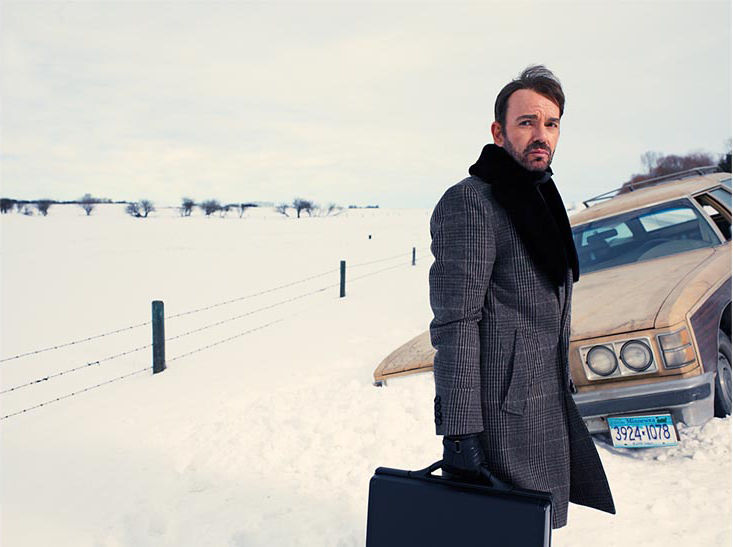As the late Fulton Sheen once said to an evolution fundamentalist: “We are not risen apes, but fallen angels.”
Granted, angels can fall pretty far (see: Lucifer), and the results can be horrifying (see: Lucifer, again). So too it is with us, and although I don’t believe the creators of the FX series “Fargo” had that message upmost in their artistic minds, the series is still a compelling and thought-provoking examination of evil, its perverse allure and its dire consequences.
Evil is not the easiest dramatic element to portray in art and television is not the easiest form of expression to describe as art. That stipulated, television can still be an environment where big themes are explored. And even though much of what is on television is an affront to the Judea/Christian tradition, we, as discerning Catholics can either stay engaged with the popular culture cards we’ve been dealt or ignore them.
I choose the former and believe that, even in instances where the intent of writers, actors and directors may not have been to revisit the ramifications of the Council of Trent, a discriminating Catholic “eye” can do a little spiritual excavation, even in a mineshaft as regularly inelegant as television — which brings me back to the portrayal of evil in art, and the series “Fargo.”
In this Fargo, a kind of parallel universe to its namesake 1996 film, we meet an incarnation of evil named Lorne Malvo. Played effortlessly and with a chilling likeability by Billy Bob Thornton, Malvo is like the devil being set loose on Earth with no constraints. God does make an appearance via a guilt-ridden supermarket magnate, but unless there is some unsuspecting reveal coming at the end of the series, the Almighty seems to be used more for a plot gimmick than anything else.
As Billy Bob Thornton conjures him, Malvo is a hired killer of some mystery. He’s capable of intense, emotionless violence performed with practiced skill. He neither distresses over nor doubts any of his evil actions or their results. He is a character with a lot of self-esteem.
I don’t know if the creative forces that have produced “Fargo” share a Catholic point of view of sin, death and salvation. The entrance God makes in the series makes me think they probably don’t. That does not mean there isn’t much to appreciate and think about in a show that is well written, acted and produced. They have created a world where evil takes many forms, from the chameleon-like coolness of Malvo to the thoroughly jellyfish-like Lester Nygaard, played by Martin Freeman — who hails from Middle Earth, but in this series becomes more Orc-like in every ensuing episode.
Watching Malvo sink his teeth into Lester’s psyche is like watching a chemical furniture stripper go to work on a veneer finish. We are fallen creatures so we can’t take our eyes off Malvo. We are lulled into his world deeper and deeper in the very first episode of this series and want more of him — more scenes where he is deliciously creepy, more scenes where free-range evil carries us along wherever it may, until we get sucker-punched into reality and witness the fruit of this evil from our living room vantage points.
I am acculturated enough into my Catholic faith that when I see sin in the art I consume I want to see some kind of corollary of salvation. So far, “Fargo” is devoid of that. Granted, there are “good” characters in this show, people who may be simple but are not portrayed as simpletons, with a few exceptions. Yet, they pale in comparison to the dramatic sway the evil characters wield over us.
We tend to feel better about ourselves when we compare real extroverts of evil like Hitler and Stalin and dramatically conjured ones like Macbeth and Lorne Malvo to our more pedestrian peccadilloes. There’s a tendency to feel good about their badness because at least we are not as bad as they. This is that Catholic penchant of “aiming” for Purgatory.
Contrary to the most extreme expressions of good old-fashioned Calvinism, I do not suggest for a minute we are all equally guilty of the same sin as Hitler and Stalin and that we are all equally depraved. That isn’t what I believe or what the Church teaches; otherwise there would be no need for Purgatory. Instead, as I like to tell my good old-fashioned Calvinist friends, we are like the finest Waterford crystal ever created, except we all have a serious crack. It’s a defect we cannot fix ourselves but requires an outside hand. And if we aren’t careful, and access the crystal repair Man, that crack can grow exponentially.
Alas, no board-certified crystal repair expert seems to be in the vicinity of the fictional Fargo and I fear most of the characters who reside there are going to be all the more worse off for it. Nature abhors a vacuum but evil, and the devil and manifestations like Lorne Malvo, thrive in the empty spaces we carve God out from. The mayhem that ensues on “Fargo,” a fiction, reflects a fact that without God we have Fulton Sheen’s admonition in reverse and populate the world with risen apes.
Robert Brennan has been a professional writer for more than 30 years, including many years in the television industry. He has been a contributing writer for the National Catholic Register for many years and has also been published in Our Sunday Visitor and This Rock.

